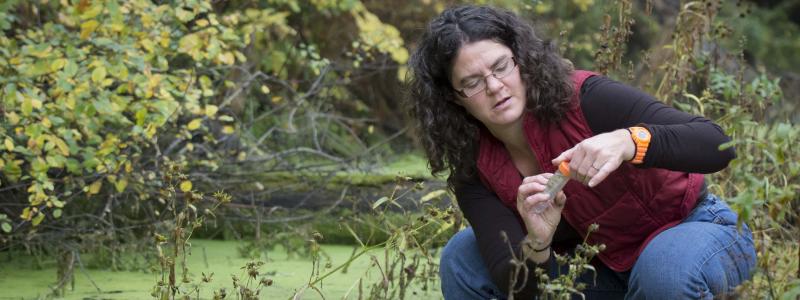
Environmental Engineering Major
The School of Civil and Environmental Engineering offers a bachelor degree program in Environmental Engineering (EnvE), which is jointly offered by the College of Engineering and the College of Agriculture and Life Sciences at Cornell University.

The Environmental Engineering Major inspires students and provides opportunities to engage with the local community, the nation and global society. The focus of the undergraduate program is to educate the leaders of the next generation’s environmental engineering professionals working in industry and in government. However, we recognize the need for direct engagement in research and outreach to inform the undergraduate program, to help it to remain cutting edge and to provide those leaders with an appreciation of scientific and public issues.
Program Educational Objectives
The Program Educational Objectives (PEOs) of the Environmental Engineering major are to:
- Demonstrate in their professional practice strong technical abilities, leadership, communication, and teamwork;
- Engage in lifelong learning through the pursuit of advanced degrees and/or other opportunities for professional development outside of the classroom;
- Contribute to the design, construction, and operation of solutions to societal problems involving environmental systems;
- Demonstrate commitment to professional and ethical norms prioritizing public health and safety, environmental protection, and sustainability.
Student Outcomes
Our Environmental Engineering B.S. degree program is accredited by the Engineering Accreditation Commission of ABET, https://www.abet.org. The following Student Outcomes (SOs) are assessed in the evaluation of our Environmental Engineering program, as part of our accreditation process.
We advise EnvE students to think about these desirable outcomes and consider how through their choice of electives and co-curricular activities they can develop these abilities, and desired knowledge and understanding. Some students may want to emphasize particular issues or skills. But, none should be neglected – the successful environmental engineer needs to have a broad understanding of social and technical issues and the ability to communicate, as well as being outstanding technically.
As a result of their completion of the BS EnvE program, students should have the ability to:
- identify, formulate, and solve complex engineering problems by applying principles of engineering, science, and mathematics.
- apply engineering design to produce solutions that meet specified needs with consideration of public health, safety, and welfare, as well as global, cultural, social, environmental, and economic factors.
- communicate effectively with a range of audiences.
- recognize ethical and professional responsibilities in engineering situations and make informed judgments, which must consider the impact of engineering solutions in global, economic, environmental, and societal contexts.
- function effectively on a team whose members together provide leadership, create a collaborative and inclusive environment, establish goals, plan tasks, and meet objectives.
- develop and conduct appropriate experimentation, analyze and interpret data, and use engineering judgment to draw conclusions.
- acquire and apply new knowledge as needed, using appropriate learning strategies.
For program enrollment please click on this link.
Careers Paths
Environmental Engineers may work as researchers, designers, planners, operators of pollution control plants and water supply systems, educators, consultants to private and public businesses, government regulatory agency officials, or program managers in profession and technical engineering societies.
Environmental Engineers design systems to provide energy from renewable and sustainable energy sources, and prevent, reduce, or repair environmental damage caused by human activities. They work to contain, reduce, or prevent hazardous waste, air pollution, or contaminated streams and groundwater. They may also design water treatment plants to deliver safe drinking water to municipal residents or design pollution control systems for industries and cities. They help in the reconstruction of stream channels, and wetlands and estuaries to preserve the environment and to maintain habitat for fish and wildlife.
Student Organizations
To learn more about student project teams, please visit our page on Student Organizations.
FOR MORE INFORMATION CONTACT:
Nicholas Wagner
Undergraduate Program Coordinator
College of Engineering
School of Civil and Environmental Engineering
Email: nw346@cornell.edu
Brenda Marchewka
Student Services Coordinator
College of Agriculture and Life Sciences
Department of Biological and Environmental Engineering
bls19@cornell.edu
Community-engaged research to monitor Ithaca’s water supply

